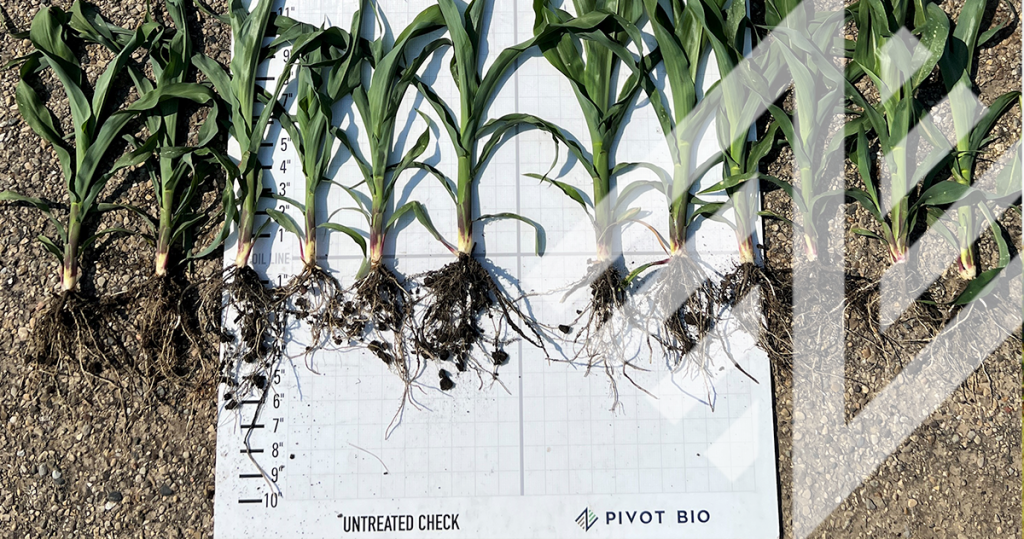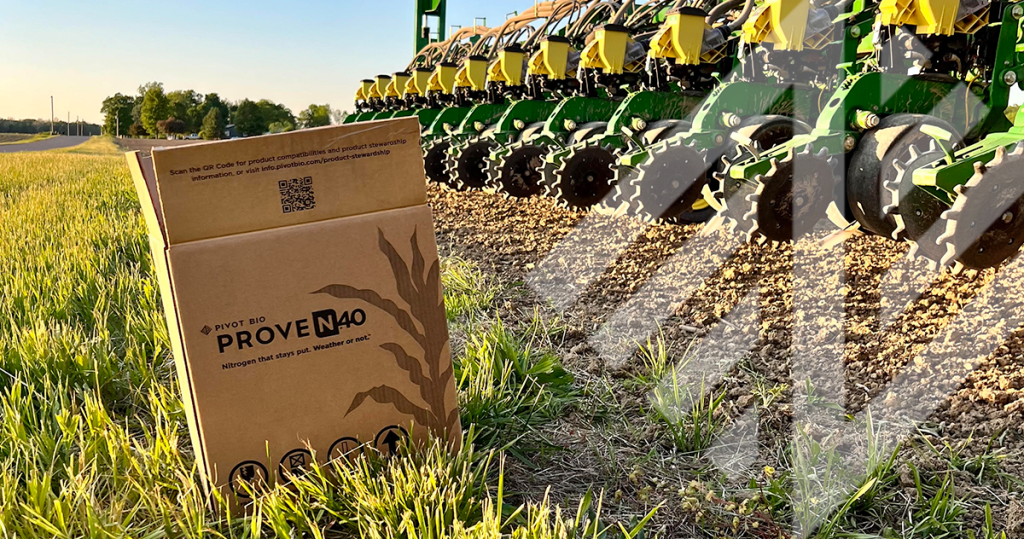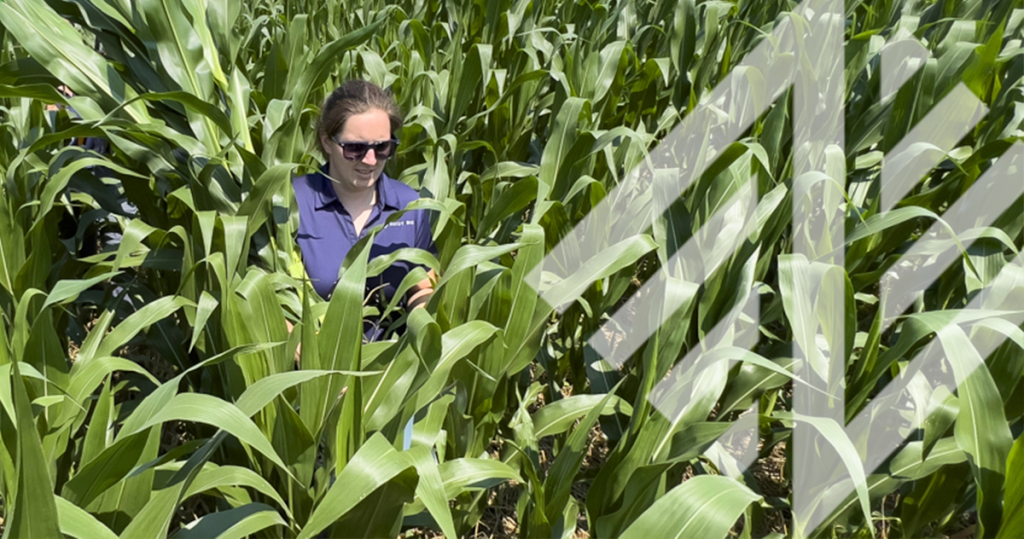NC State University Finds Pivot Bio’s PROVEN 40® Increases Productivity

Pivot Bio is on a mission to solve the nitrogen dilemma with products that safely and effectively replace synthetic nitrogen in a way that benefits farmers and the planet. For the past decade, our researchers have fine-tuned our microbial products to deliver consistent results across many environments and support agricultural productivity. Pivot Bio’s nitrogen fixing microbes can help most farmers replace some of the nitrogen in their corn production systems and maintain or exceed current yield levels. To help solve the nitrogen dilemma, the agricultural community needs solutions that reduce inputs without negatively impacting output. For a farmer, productivity is critical. It reflects not only crop yield, but the financial gains from a given area of cropland.
Pivot Bio PROVEN® 40 contains improved nitrogen fixing microbes that colonize corn roots, turn atmospheric nitrogen into a form that plants can use, and provide some of that fixed nitrogen to the corn plant. Corn planted treated with PROVEN 40 are generally larger than control plants. Increased shoot and root biomass along with increased nitrogen uptake have been widely documented. This effect is not much different than the growth response that would occur when adding extra synthetic nitrogen. A healthy plant needs a robust root system to access nutrients and water from the soil and shoots that quickly reach maximum photosynthetic output. Better nutrient access in early plant growth stages can boost biomass and ultimately results in more productive crops.
Pivot Bio leverages an extensive testing network that includes farmers, contract researchers, consultants, third party institutions and universities. Data collected from this vast network of cooperators can be used to model product performance across various environments. Our university collaborators provide local production system expertise and help us better position our products into farmer fields in their geography. In this article, we discuss results from our collaboration with Dr. Ron Heiniger at North Carolina State University in eastern NC.
At Pivot Bio, we know that independent research is critical to delivering quality data that farmers can consider when making decisions for their acres. University research leverages the talents of world-class researchers, diverse testing sites, and a disciplined approach to the scientific process. We partnered with Dr. Ron Heiniger at North Carolina State University (N.C. State) to investigate the impact of PROVEN 40 on nutrient uptake and yield in corn and compared results to non-treated corn plants. This study put our product through rigorous testing to see how our microbes impact nutrient uptake and productivity.
Dr. Ron Heiniger, a leading researcher in precision agriculture, crop growth and physiology, and the Corn Extension Specialist for N.C. State, led the research efforts to test PROVEN 40 in 2022. Dr. Heiniger also evaluated Pivot Bio’s first-generation product PROVEN® in 2020. Dr. Heiniger’ s research program is focused in eastern NC where the majority of the state’s corn crop is produced. Soil types can range from low organic matter sands to black sands with significant organic matter to organic muck soils in the region referred to as the Black Lands. Dr. Heiniger understands N.C. soils and corn production systems and how to put products through their paces in locations that represent key growing environments.
Trials were established in the Atlantic Coastal Plains of Eastern NC at the Peanut Belt Research Station near Woodville, North Carolina on sandy loam soil, and Harris Farm near Roper, NC, on muck soil. Both sites were not irrigated. Corn grown in sandy soils of this region like those at the Peanut Belt Station with limited water holding capacity can rapidly succumb to the effects of drought during dry periods and rapidly lose nitrogen from leaching during rainy periods. In contrast, Harris Farm is on land that was previously a swamp and has a very high organic matter content. This soil type is rich in nutrients and has different input requirements from sandy soils. Testing PROVEN 40 across multiple soil types provides valuable data for farmers with differing production requirements and generates data to better characterize our products for all growers.
Studies at both sites were conducted using a replicated split plot treatment structure. The main factor evaluated was microbe treatment. Plots received no microbe, Pivot Bio PROVEN 40 applied in furrow at 12.8 fl. oz/A or PROVEN 40 applied in furrow at 25.6 fl. oz/A. Carrier volume was 5 gallons of solution per acre. Five different nitrogen rates were evaluated within each of the main plots: 70, 110, 140, 180, and 200 pounds per acre. All nitrogen reductions of 30% UAN to achieve the rates listed previously occurred at side dress. All plots received a 20 gal/A 3x2x2 application of 10-27-0 plus micronutrients at planting and a broadcast 15.6 gal/A application of 30% UAN immediately after planting.
Above ground plant biomass was collected at V6 and VT growth stages and tissue analysis was conducted to determine nutrient content. A leaf firing score, where the number of green leaves below the ear are counted, was determined between R3 and R4 growth stages. Yield was collected from center plot rows. Biomass and tissue analysis data were used with plant population to determine nutrient uptake on a per acre basis. Dr. Heiniger also calculated optimum economic nitrogen rates for non-treated and PROVEN 40-treated plots.
Corn plots at the Peanut Belt Research Station experienced dry conditions during the critical period between V10 to R1 growth stages and a 1.5-inch irrigation was applied to reduce the further negative impact of severe drought on yields. As farmers know, drought and resulting crop stress can reduce the uptake of nitrogen and other nutrients like potassium that enter the plant primarily via mass flow. Interestingly, even under these drought conditions, compared to the non-treated control, corn treated with PROVEN 40 generally had greater biomass and uptake of nitrogen and potassium. Economically optimum nitrogen rates were about 18 pounds per acre less in PROVEN 40-treated plots than in non-treated plots. Using PROVEN 40, equal or more corn was produced using less nitrogen. The researchers believe the corn plants would have experienced greater measurable benefits of PROVEN® 40 had the drought not occurred, like at Harris Farm which maximized corn yields with PROVEN 40 using about 40 lbs./acre less applied nitrogen than standard farming practices. Averaged across nitrogen rates, corn plants treated with PROVEN 40 at Harris Farm had significantly greater yields than the non-treated corn, at about 8 to 12 bushels/per acre.
PROVEN 40 generally allows crops to establish greater biomass and a nutrient uptake advantage earlier in the growing season compared to nitrogen fertilizer alone. This early advantage often results in higher productivity at harvest time. Using PROVEN® 40 can enable farmers to use less nitrogen across their acres while maintaining or increasing their yield. Establishing healthy plants early in the growing season allows plants better access to nutrients and facilitates more rapid canopy closure which can maximize photosynthesis. Dr. Heiniger’s research demonstrated that benefits from PROVEN 40 can be realized even in periods of environmental stress. Corn plants with higher biomass and nutrient uptake, like the ones treated with PROVEN 40, tend to produce robust yields and in turn financially benefit the farmer. This study is part of our commitment to provide independent performance data for farmers to evaluate our products. Dr. Heiniger’ s research at N.C. State documented that PROVEN 40 worked as intended in his testing environments and illustrates that PROVEN 40 can likely be a new nitrogen management tool for growers in eastern North Carolina.


